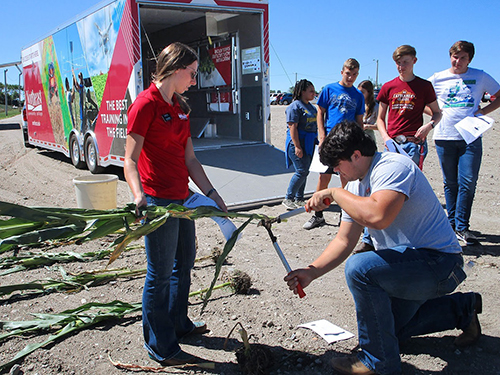NORFOLK, Neb. -- Northeast Community College will be the headquarters of a national agriculture consortium for two-year colleges, serving as the lead institution and fiscal agent for the $9-million, four-year program.
Funding for the effort, a cooperative agreement between U.S. Department of Agriculture – Natural Resources Conservation Service (USDA-NRCS) and the Community College Alliance for Agriculture Advancement (C2A3), was announced recently.
C2A3 is a collaboration of nine schools across eight states that began eight years ago as a 501c3 organization. Member schools in addition to Northeast are Central Lakes College, Staples, Minn.; Clark State College, Springfield, Ohio; Illinois Central College, East Peoria, Ill.; Ivy Tech Community College, Lafayette, Ind.; Lake Area Technical College, Watertown, S.D.; Northcentral Technical College, Wausau, Wis.; Northeast Iowa Community College, Calmar, Iowa; and Richland Community College, Decatur, Ill.
Tracy Kruse, vice president of Development and External Affairs at Northeast, serves as the group’s executive director.
“C2A3 began as a Midwest consortium,” Kruse said. “But with this partnership, we will be able to expand to include colleges from across the nation. Our goal is to have at least 50 community and technical college members by the end of the four-year award period.”
C2A3 will become a national hub for two-year ag education, developing expertise and regionally specific programming and curriculum that can be replicated across the country. Through this alliance, member colleges can access these resources and gain assistance in building partnerships with their local and state USDA-NRCS offices.
Astrid Martinez, director of the Conservation Planning and Technical Assistance division with USDA’s Natural Resources Conservation Service, has been very active in getting this agreement established.
“C2A3 schools will increase students’ interest in agriculture, natural resources, and conservation, with a focus on preparing students for USDA jobs. National skill standards will be developed in natural resource conservation, precision agriculture, and agronomy,” Martinez said. “This is an important step in developing the next generation of agricultural leaders.”
The national ag education consortium will also encourage applied research and outreach activities on college farms and urban agriculture facilities. Several C2A3 schools, including Northeast, already have continuous projects in place that are related to soil quality, water quality, urban agriculture, livestock, and grazing.
Proposed projects include artificial intelligence and precision livestock; crop drainage and irrigation management; soil quality, field/pasture renovation, and cover crops; water quality, pond, and wetland management; silvopasture management; and urban agriculture.
“Student participation in applied research is the cornerstone of cultivating the next generation of agricultural innovators and problem solvers,” Kruse explained. “By using real-life examples of conservation in classroom and laboratory experiences, students can bridge the gap between theoretical knowledge and practical application.”
The expanded C2A3 consortium will also create internship opportunities and student leadership experiences that include real life skills and networking with USDA employees. In addition, it will provide support for faculty and students to attend an annual conference and gain practical experiences and knowledge to put to future use.
“The rapid growth of technology in agriculture requires colleges to be nimble and respond quickly to changes within the industry,” Kruse said. “This alliance will support the colleges and provide them the tools to rapidly respond to the workforce needs within agriculture.”
This agreement will fund the hiring of four employees to implement this work, including the hiring of a national director, a curriculum designer, an outreach coordinator, and an executive assistant. These positions will work remotely and will be accessible to all member institutions and USDA-NRCS as the partnership is built.
The alliance is expected to start this work immediately. For more information on C2A3, visit www.agalliance.net.
About Northeast Community College
Northeast Community College serves 20 counties in northeast Nebraska. The college has 12 career pathways in the Agriculture, Food and Natural Resources field of study, including: associate of applied science degrees in agribusiness, mechanized agriculture, urban agriculture, agronomy, animal science, , diversified agriculture, horticulture, precision agriculture, and veterinary technology; diplomas in horticulture/golf course management and dairy technician; and non-credit Department of Labor credential and chemical applicator license credential in chemical applicator apprenticeship. Transfer pathways include both an associate of arts degree and an associate of science degree in agriculture, an associate of science in natural resources, and an associate of science in pre-veterinary technology.
###

